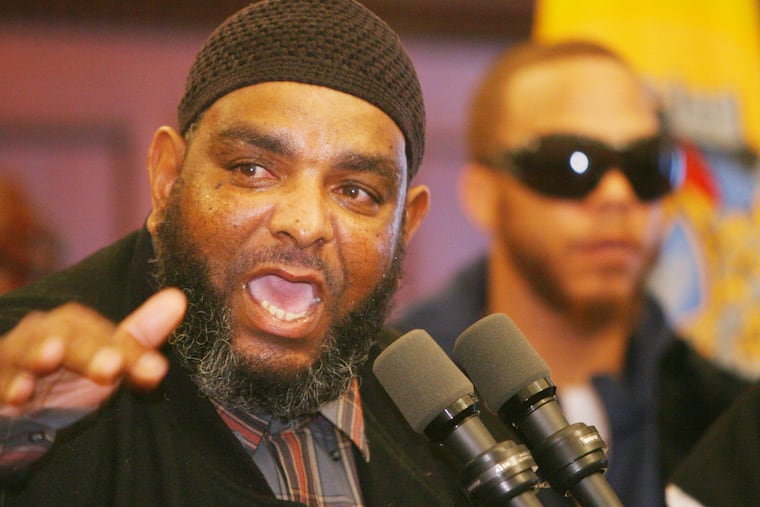Malik Aziz, Philly activist who showed ex-prisoners they can be change agents, dies at 66
Aziz, a former prisoner, became a founder of grassroots anti-violence organizations, a political insider who ran Philly's re-entry office, a squasher of gang beefs, and a voting-rights advocate.

Malik Aziz, 66, who was in his youth a gang member, drug dealer, and then prisoner, but spent the balance of his life fighting against violence in Philadelphia and blazed a path for a generation of formerly incarcerated civic leaders, died Thursday, Sept. 3, of kidney failure.
Mr. Aziz became a founder of grassroots anti-violence organizations, a political insider who ran the city’s reentry office, a squasher of innumerable beefs, and a convener who rallied activists, politicians, and celebrities to oppose violence and work for social justice.
“He conceived how to get formerly incarcerated people to play a role in electoral politics,” said Bill Cobb, a community organizer, who counted Mr. Aziz as a mentor.
He said the memory of meeting Mr. Aziz remained vivid. It was 1993, in the yard at SCI Camp Hill: “I’m 23 years old, and I’m in the yard with six other men, conspiring to stab some other man.” Mr. Aziz put a stop to it. “He saved my life. He showed me a different path, and everything I do that’s benevolent was because of his benevolence.”
Mr. Aziz grew up as Marvin James Bing Jr. in Roxborough, where he completed high school and won college basketball scholarships, but found selling crack easier and more lucrative, he later told reporters. He racked up more than 10 arrests before a three-to-six-year state prison term set him on a new path.
Mr. Aziz, who changed his name after converting to Islam, tried to create a sense of civility in prison, organizing caroling and gift-exchanges for the holidays, and cofounding Ex-Offenders Inc., for inmates committed to self-transformation. He also began writing to then-City Council President John F. Street, pitching reentry programs.
He was released for the last time in 1995, determined to make good — and make an impact, at a time when Pennsylvania barred felons from voting for five years after release.
He campaigned for Street’s mayoral run, then helmed the Mayor’s Office of Reentry Services. In 2000, he successfully fought to restore the vote to those with felony convictions.
“Malik understood that if you can’t show a person a way to live, the chance to recidivate becomes much higher,” said Street’s son, State Sen. Sharif Street, who came up in North Philadelphia politics alongside Mr. Aziz. “He understood that part of what people were fighting in low-income communities was hopelessness.”
In response, Mr. Aziz organized anti-violence car caravans and marches and then, after deaths occurred anyway, joined vigils. In 2002, aiming to bind the city’s assorted grassroots programs into a coalition, he helped launch Men United for a Better Philadelphia, which dispatched outreach to high-violence corners with offers of jobs, counseling, and mentorship.
Mr. Aziz was known for settling gang wars on the corner, said Bilal Quayyum, who helped found Men United and now runs the Father’s Day Rally Committee.
“He would get the groups together that were fighting," Quayyum said, and convince them that it wasn’t in their best interest or the community’s interest, and because he had real street cred, they would listen to him.”
An Inquirer profile once described Mr. Aziz as a “menacing figure,” about the shape and size of a refrigerator with an intimidating gaze. His son Marvin Bing — who grew up in foster care and group homes while his father was in prison — said that was just tough love.
Despite his difficult childhood, Bing, now a New York-based organizer, is grateful for the lessons his father offered “Turning my anger and my pain into a fight for my community, that was the best thing he could have ever given me.”
Over the years, Mr. Aziz offered a lifeline for hundreds of people coming home from prison, like Jondhi Harrell, who now runs the nonprofit Center for Returning Citizens.
“A lot of folks don’t realize the foundations that people lay, that result in their being able to live a different life," Harrell said. "But to get to that point, people have to fight and struggle and be broke, and Malik did all of those things.”
In addition to his son, Mr. Aziz was survived by son Anthony Felton and “a slew” of children and stepchildren, Felton said.
Arrangements for a memorial service are pending.